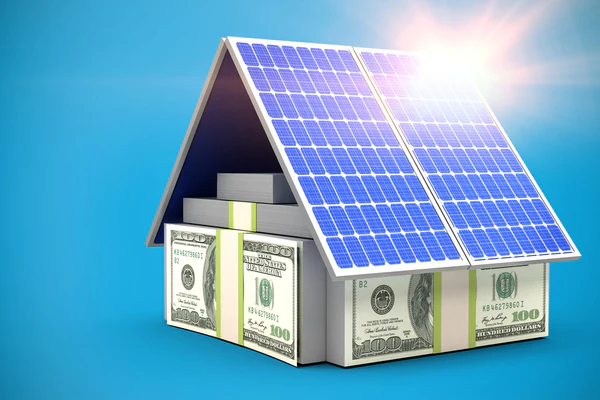Just How Solar Power Can Aid You Conserve Money and Lower Your Carbon Footprint
The combination of solar power right into your energy portfolio presents an engaging possibility for both financial cost savings and environmental stewardship. By taking advantage of the sunlight's energy, house owners can dramatically lower their monthly utility expenses while additionally guarding versus the unpredictability of future energy costs. The change to solar adds to a marked decline in carbon exhausts, lining up personal money with wider ecological objectives. As different government incentives become readily available, the concern arises: just how can one effectively browse the preliminary investments and continuous benefits of solar modern technology to take full advantage of both economic and ecological gains?
Recognizing Solar Power Cost Savings
While the transition to solar power frequently entails a preliminary financial investment, understanding solar power cost savings is crucial for homeowners and organizations alike. Solar energy systems can substantially reduce electrical power expenses by using the sunlight's energy, translating into considerable lasting financial advantages. By generating their very own electrical power, users decrease dependence on grid power, which undergoes changing prices. These financial savings can collect over time, typically resulting in a fast return on financial investment.
Additionally, solar energy systems may receive various monetary incentives, including tax obligation debts and discounts, better boosting their cost-effectiveness. The accessibility of net metering allows customers to offer excess power back to the grid, developing an added profits stream. These aspects contribute to the overall savings related to solar power.

Along with route financial savings, solar power offers the added benefit of increasing building worth. Residences equipped with photovoltaic panels are frequently more attractive to customers, as they assure reduced power expenses - Simply Solar Illinois. Comprehending these components is vital for anyone considering solar power, as it highlights not simply the prospective economic gains, however also the broader ecological and financial advantages of embracing renewable resource remedies
Preliminary Expenses vs. Long-Term Perks
When reviewing solar energy, it is very important to weigh the first costs versus the lasting advantages. The in advance investment for photovoltaic panels, setup, and related equipment can be significant, usually varying from $15,000 to $30,000, depending upon the system size and home energy requirements. This initial expense may deter some house owners; however, it is critical to think about the potential financial savings gradually.
As soon as installed, solar power systems can substantially lower or also eliminate regular monthly electrical power costs, leading to substantial lasting financial advantages. Studies indicate that home owners can conserve anywhere from $10,000 to $30,000 over the life-span of their solar system, typically 25 years. Furthermore, numerous states provide rewards, tax obligation credit reports, and rebates that can balance out preliminary prices, making solar a lot more obtainable.

Lowering Your Carbon Footprint
Lowering your carbon impact is an important consideration in today's eco conscious culture, and adopting solar power is one of one of the most effective approaches to achieve this objective. Solar power is a tidy, renewable energy that significantly diminishes dependence on nonrenewable fuel sources, which are major factors to greenhouse gas emissions.

Moreover, the extensive fostering of solar innovation encourages the growth of green jobs and supports advancements in energy storage and effectiveness. The even more people and organizations buy solar energy, the higher the collective reduction in carbon emissions, promoting a cleaner environment for future generations.
Government Incentives and Discounts
Embracing solar energy not just benefits the setting but can additionally bring about substantial economic savings, especially with the availability click this of government motivations and rebates. Various government, state, and regional programs are created to encourage property owners and organizations to invest in solar power systems, making the shift extra affordable.
One of one of the most prominent rewards is the Federal Investment Tax Credit (ITC), which allows solar system owners to deduct a significant percent of the installation costs from their government tax obligations. This reward has been essential in reducing the ahead of time costs connected with solar power systems. In addition, several states supply their own tax credit ratings, gives, and discounts that can further enhance cost savings.
Additionally, some regional governments provide real estate tax exemptions for solar installments, ensuring that home owners do not encounter boosted real estate tax as an outcome of their renewable resource financial investments. Energy business might additionally use motivations, including web metering and feed-in tariffs, which permit solar power individuals to market excess power back to the grid.
Picking the Right Planetary System
Picking the ideal solar system is essential for maximizing energy performance and economic advantages. The decision depends upon numerous factors, including power needs, budget, and readily available area. House owners should begin by evaluating their power consumption to identify the system dimension needed for optimum performance.
Next, consider the different sorts of solar technologies readily available. Simply Solar Illinois. Photovoltaic (PV) panels are the most typical, transforming sunlight directly into electricity, while solar thermal systems concentrate on home heating water. Each advice type has distinct advantages relying on specific needs
Budget plan factors to consider are additionally extremely important. Preliminary installation prices can vary considerably, so it's crucial to contrast quotes from numerous service providers and discover financing choices. Government incentives and refunds can better reduce the financial problem, making solar systems a lot more accessible.
Final Thought
In recap, solar power presents a viable option for achieving substantial cost financial savings while at the same time reducing carbon emissions. The initial investment, though substantial, yields considerable long-term economic advantages, with potential cost savings varying from $10,000 to $30,000 over 25 years. In addition, the ecological benefits of solar power add to lasting practices vital for combating environment adjustment. Federal government incentives boost the feasibility of solar modern technology fostering, urging a shift towards a cleaner, much more economically efficient power source.
Comments on “Why Choose Simply Solar Illinois for Eco-Friendly Energy Solutions?”